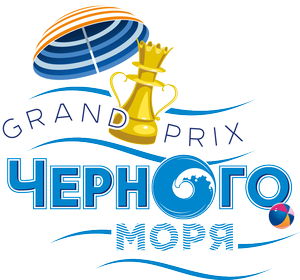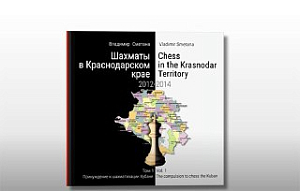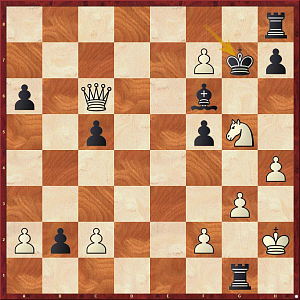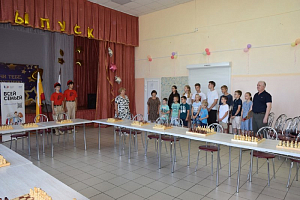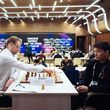1 October 2015
Andrey Filatov: Chess is a Great Educational Game
RCF head and UNESCO medalist talks about the passion for his work, chess in Russia, and Soviet art.

What methods do you most frequently use at the helm of the Russian Chess Federation? Persuasion? Castling? Exchange?
At the core of any management system there is always a group of like-minded people surrounding the leader and capably working towards a common goal. Management will be efficient if you manage to build a team of like-minded people. This is valid for chess, just like it is for art or business.
What are the particularities of sport and art management?
To a skilled manager, there are no major differences. One is always efficient if one is passionate about what one does. If you are an art manager but you are not passionate about art, it is something almost impossible to conceal. It can probably be concealed in some other areas, but still people should be passionate about what they are managing.
There is a sentiment that the 20th century chess boom has eroded to nothing. To what extent is today's world interested in chess and chess players?
I once asked in an Arab country: "How do you popularize chess?" They answered: "We are tracking every single player." I asked: "Why?" And they said, "Of course we do! If one is able to checkmate the King, one must be also potentially able to overthrow the Sultan!" On the other hand, I spoke with the President of Armenia and he said that he embedded chess in school curriculum. In fact, a great many countries are now doing so. We conducted a sociological survey in Armenia and found that children who played chess did not use drugs. The fact is that chess teaches children responsibility for their actions. In addition, children learn to estimate and analyze the consequences of their actions. As a result, children's drug addiction in Armenia went down dramatically. And history knows other similar cases. In the aftermath of the "opium wars", a significant portion of China’s male population was addicted to drugs. And those people were rescued and returned to normal life with Chinese chess. The problem was completely solved within a century. Clearly, chess can have practical application to everyday life.
What is chess for you - is it more an art or a sport?
For me, chess is rather a sport because in the end, result is what matters here most. You can play as beautifully as you like but if you don’t achieve results...
And what better reflects reality - art of chess?
Chess is a great educational game. And art ... When it comes to contemporary art, the artist probably better feels the time in which he lives, and is able to convey his feelings to the viewer.
Chess, then, is not a mirror?
It's more of a language by which people communicate with each other. An intelligent language. And the language of chess is based on logic, while that of art - on emotions. With me, these two parallels do not intersect and do not interfere with each other. It's like the head and the heart, which are equally vital and important for the harmonious person.
What does philanthropy mean to you? Why do you need it?
Above all, it is self-expression. And besides, an opportunity to remind the world about the importance and greatness of our art. Here is an example. Together with my partner, a well-known businessman Gennady Timchenko, I organized the World Chess Championship in the Tretyakov Gallery. There are about 600 million chess lovers in the world, and a multi-million audience watched the broadcast of the Anand/Gelfand game. Instead of ad units, the broadcast included lectures on Russian art. As a result, and this is a very significant cultural outcome of the chess championship, we have seen a growing interest in Russian and Soviet art across the world.
What do you think about the opinion that true talent will always manage to market and promote itself?
I believe that talent should be assisted. It is difficult to fulfill oneself as an artist without proper conditions.

When working with art, do you rely on personal taste?
Speaking of personal choices, I only buy what I like, and that is Soviet art.
Do you prefer socialist realism or something less conventional, like Rabin and Nemukhin?
I neither appreciate nor accept the term socialist realism. There is great Soviet art, which had an influence on at least half of the world. And today there is a tendency to divide it into some schools and styles. It is very diverse but all of it is Soviet art.
And was the fact that it was in some way isolated from the outside world harmful or helpful?
It was not isolated from the outside world. In visual arts, we competed with the rest of the world, and we were quite good at it. The same is true for the ballet, science and military technology. The famous Soviet sculptor Vera Mukhina won the gold medal in Paris. The painter Victor Popkov won the Grand Prix at the Biennale there. The Soviet Union had many achievements, and we greatly influenced the global culture. We just had a different aesthetic: the workingman, heroics, peace, creativity, purity, and love for the Motherland.
What place does chess occupy in today's Russia?
Chess is very popular and has been developing quite actively. It simply migrated to the Internet to a large extent. You would be surprised to see how many tournaments are held online and how many people are watching chess broadcasts. I believe that chess is now at its peak, stirring interest that is much higher than it was in Soviet times.
Really?
Last year, the Russian president attended chess competitions twice. There were leaders from other countries as well. White Castle, a national tournament in the past, has been turning into an international event, with many other countries applying. In a short time, Russia successfully hosted two World Chess Championships for men. Aeroflot Open is listed in the Guinness Book of Records as the tournament with the highest number of participating GMs in the history of chess: more than 150 from more than 60 countries. Chess in Russia is loved and supported. Among those who do a lot for chess is Dmitry Peskov, Arkady Dvorkovich, entrepreneurs Vitaly Savelyev, Samvel Karapetyan, and Andrey Guriev.
Are tournaments established by corporations a new phenomenon in chess?
No, this is nothing new. Chess in the 20th century developed mainly through tourism. In the off-season, world capitals, major historical and cultural cities traditionally hosted big chess tournaments with the participation of well-known grandmasters. Not surprisingly, this boosted tourist flows, as there are millions of chess lovers all over the world. Today, tourist cities continue to allocate budgets for tournaments. As for corporations, many IT-companies such as Microsoft, promoted their brands through chess tournaments. That makes sense. For example, if a “masterpiece” game is played at the Aeroflot Open, chess fans all over the world research and analyze it, which increases brand awareness and promotes it as smart and intelligent. But chess players are generally fond of Aeroflot anyway. I think a good player flies about twenty-five times a year. And when we take a seat in an Aeroflot aircraft, we feel as if we were almost home.
What countries are now the main suppliers of grandmasters?
This is a difficult question. Now it's probably China and India. In Europe, interestingly, the highest number of grandmasters is from Germany. This may be linked to the level of economic development. I leave Norway aside because chess is simply booming there right now: you can hardly find a cafe without a chess game and multiple TV channels broadcast chess tournaments. As for children's chess, France is currently the place.
Do you play chess with the computer?
I used to. But I'm trying to play less now: chess requires time and I do not have any.
Are you saddened by the realization that, sooner or later, the machine will replace a human grandmaster?
The car goes faster than a human, but that does not annihilate athletics. One shouldn’t compete with the computer, that's all.
What did you feel when you received the UNESCO medal for outstanding achievements in the field of culture and art, as well as for your contribution to international cultural relations? Is public recognition important to you?
I was pleased. My work was recognized. Such a big and reputable organization ... It was unexpected and satisfying.
Chess players, like artists, are often a little out of this world. They have a different scale of values, so to speak. How do you manage to communicate with such people?
You know, there was a curious case in history. When Korchnoi played with Che Guevara who was actually a pretty good player, Korchnoi was asked to make a draw. Korchnoi won. He was then approached and asked, "Why?" And Korchnoi replied: "Well, he has absolutely no idea about the English Opening!» As I said, chess is a sport, and its main criterion is the result.
By Artyom Lipatov, Aeroflot Premium magazine











